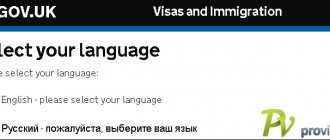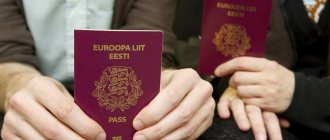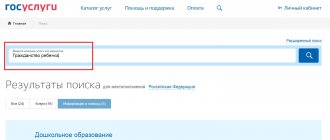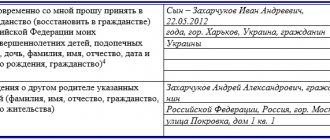How to write citizenship correctly in an application form
How to write citizenship in the application form? In practice, the question arises when it is necessary to fill out the “Citizenship” column in official documents.
In the “Citizenship” column you must write the name of the state in the nominative case - “Russian Federation”. You cannot write “Russia” or “Russia”.
Some questionnaires allow the possibility of writing “Russia” in the “Citizenship” column, but “Russian Federation” is the official filling option that will satisfy any, even the most strict, questionnaire checker.
Please note that not all official questionnaires allow the abbreviation of the Russian Federation to the abbreviation RF.
In addition, in some cases, for example, when filling out a form when joining the Federal Bailiff Service of the Russian Federation, it is recommended to indicate “Citizen of the Russian Federation” in the “Citizenship” column.
Filling out a form in foreign documents
When preparing documents and forms in a foreign language, applicants often encounter problems. This is due to the fact that in some languages the words “nationality” and “citizenship” are defined the same way. For example, in French this is the word nationality. In this case, you must use the following rules on how to write citizenship in a visa application form:
- Most organizations, if they do not know the language, provide applicants with application forms in Russian; in extreme cases, you can ask for a document in English. In this case, the citizenship column in the application form will be indicated by the word “Citizenship”, and nationality – “Nationality”.
- Usually, official documents indicate a person’s citizenship, but to avoid problems and additional waste of time, it is worth clarifying this issue in advance.
- When filling out questionnaires in a foreign language, the same principles of filling out should be taken into account. That is, you cannot shorten, break off a phrase, or write an incomplete name of the country. The phrase Russian Federation must be spelled out in full. In the Nationality line the word “Russia” is written.
How to distinguish citizenship from nationality
When filling out a questionnaire, many people confuse the terms “citizenship” and “nationality”. Of course, from a legal point of view these are two different concepts.
Citizenship determines the country of which you are a citizen, but in the “Nationality” column, if one is present in the document being filled out, you should indicate your ethnic group (Russian, Tatar, Chuvash, etc.).
Confusion with filling out the “Nationality” and “Citizenship” columns may arise in foreign countries. For example, in France, since there the two terms are not distinguished.
But in the Russian Federation, indicating nationality is not mandatory, that is, it is indicated at the request of the citizen. The Constitutional Court of the Russian Federation clearly indicated that nationality in no case can have legal significance for the status of a citizen. The Constitution determines that Russian citizenship is uniform and does not depend on the grounds for its acquisition.
What is nationality
Nationality is a relic of the past. In the modern world, this term is practically not used.
It is known to those who still remember the USSR. For modern youth this term is alien.
Speaking about the modern world, nationality is understood as the attitude of a given person to a specific group of nationalities living in a particular territory and having their own language.
At its core, “nationality” is an ethnic community. Previously, it was indicated in the passport of a Soviet citizen, and the use of this term made sense.
After the collapse of the USSR and the formation of Russia, such a line disappeared from the main document. Now there is no distribution by nationality.
But when filling out various forms (for example, to obtain a foreign passport), Russian citizens are faced with a problem.
In forms related to migration, resettlement, relocations and travel, there is a “nationality” column, and it must be filled out correctly. Otherwise, consideration of the application may be refused.
Citizenship concept
The term “citizenship” implies a stable legal connection between a specific person and a specific state.
Both parties to this relationship have their own rights and obligations towards each other.
The “citizenship” column is also present in various questionnaires and applications. Do not confuse nationality and citizenship.
It is necessary to distinguish between these two concepts and correctly reflect them in official documents.
Rules for instructions when filling out questionnaires
In order not to delay the process of processing certain documents, you need to fill out the form correctly and correctly indicate both citizenship and nationality.
When it comes specifically to citizenship, you need to indicate the name of the country in the nominative case. That is, you need to indicate “Russian Federation”, but not “Russia” or “RF”.
Some government agencies allow simply “Russia” to be written in this column, but “Russian Federation” is the official name of our country, so this particular spelling will not raise questions from anyone, even the most strict inspector.
The abbreviation “RF” is not accepted by any government agencies. The name of our country cannot be shortened like that.
In addition, some government agencies require that the applicant indicate not only the country, but also the affiliation.
Namely, “Citizen of the Russian Federation”. Such requirements for applications are presented to the FSSP.
Important! In Russia, “citizenship” and “nationality” are different. From a legal point of view, these are two different concepts.
To fill out the documents correctly, you need to understand the difference.
In this column you must indicate the country whose passport the applicant holds. For example, the Russian Federation.
In the “nationality” column, you must indicate your membership in a specific ethnic group or people.
There are quite a lot of them on the territory of Russia, so along with citizenship “Russian Federation” it can be indicated - Russian, Evenk, Tatar, Yakut, etc.
Problems when filling out these two fields may arise in other countries. For example, in France, these two concepts are identical.
After the collapse of the USSR, indicating membership in one or another ethnic group in documents is not mandatory.
The applicant, when filling out various documents, decides whether he needs to indicate his nationality or not. There is also no such column in the passport of a citizen of the Russian Federation.
This happened after discrimination on this basis began to spread in the new post-Soviet space.
The Constitutional Court of the Russian Federation issued a ruling that clearly stated that nationality has no significance in determining the status of a citizen.
Double citizenship
In some forms, when filling out, you are required to indicate a second citizenship (if any), dual or previous one.
If you have dual citizenship, you must indicate not only the country of the second citizenship, but also your passport details and citizenship status.
Analyzing the legislation of the Russian Federation, we can conclude that Russia has concluded agreements on dual citizenship only with Tajikistan and Turkmenistan, and the latter has already lost force, and dual citizenship is retained only by persons who received it during the period of validity of the agreement, that is, from December 23, 1993 to 05/18/2015. In other cases, when filling out the form, we will talk about second citizenship.
If the citizenship was changed, then it should be written as follows: “In ____, the citizenship of Ukraine was changed to the citizenship of the Russian Federation.” If you need to indicate the reason, you can write “In connection with moving to permanent residence in the Russian Federation.”
ConsultantPlus has many ready-made solutions, including how to obtain Russian citizenship in a simplified manner. If you don't have access to the system yet, you can sign up for a free trial online! You can also get the current K+ price list.
Before filling out the “Citizenship” column in the application form, check how to correctly write: “Russian Federation”, abbreviated as “RF” or “Citizen of the Russian Federation”. Regardless of the correct option, we write citizenship in the nominative case.
There is even more useful information in the “Russian Citizenship” section.
Source
How to correctly write citizenship and nationality in a job and visa application and other documents
Don’t panic if, when filling out a foreign application, you don’t know where to write what or you made a mistake. In this case, you can ask for help filling it out. Each embassy has an employee who speaks Russian. If necessary, he can help with paperwork and suggest in which column to indicate which information. This is important, since the correctness of filling out the documents determines whether the decision will be in favor of the citizen or whether the issuance of a foreign passport or visa will be refused.
Citizenship and nationality - what is the difference
Every applicant knows that he has no right to make a mistake in the application form. Therefore, you need to submit information correctly the first time. Often confusion occurs with two concepts - citizenship and nationality.
The definition for both is:
Thus, it becomes clear what to write in the citizenship column: only “Russian Federation”; as an option, writing “Russia” is allowed. One thing is for sure - this column should contain the name of the state whose passport you hold. In case of coincidence of citizenship and nationality in the questionnaire, it is necessary to indicate this as follows:
If the data is different, then here is an example of what to write in the “Citizenship” line:
Some confusion may arise when it comes to filling out documents in foreign languages.
What is the difference and how are they different?
The differences in these two concepts are simply colossal. They are determined by rights and responsibilities. When it comes to nationality, it is very difficult to identify responsibilities as such. They can only occur on the basis of existing traditions and customs.
And, as noted earlier, this concept is quite ambiguous, because a certain unified form of determining nationality does not currently exist. Therefore, a person can classify himself as belonging to different nations if he has reasons for this.
Nationality does not provide a person with citizenship of the region to which he identifies himself. To obtain citizenship, a number of conditions must be met. A person can call himself Italian, and in fact have relatives from this country, but be a citizen of another state.
This could happen for a number of reasons, of which in most cases it is the deportation of parents, relocation and obtaining representation from the state where one of his parents lives.
Nationality gives a person only a minimum set of rights and freedoms, which includes the right to life, freedom of speech, and religion. Without citizenship, a huge number of problems arise that relate to obtaining medical services, official employment, and using the services of educational institutions.
There are also difficulties crossing the borders of other states.
Citizenship provides a person with a whole package of rights and obligations, the fulfillment of which is an obligatory element of a person’s life. With this document, it becomes possible to obtain official employment, use the services of medical institutions, and much more.
In addition to providing freedoms, a person is given responsibilities that he must fulfill. These include compliance with current legislation, payment of taxes, military service for men, and the inadmissibility of violating the rights and freedoms of other citizens.
If the above aspects of duties are violated, a citizen may incur administrative or criminal liability. In some particularly difficult situations, when a person commits political or particularly serious crimes, the question of depriving him of representation in the country may arise.
In this case, the person will experience serious obstacles in the life of the country, and there will also be difficulties in obtaining citizenship of another state.
Filling out various forms
One of the main rules for filling out questionnaires is that the use of abbreviations and abbreviations is not encouraged at all. This means that you should not be lazy and still write the long name “Russian Federation”, even if we are talking about applying for a job.
It is especially important to take this into account when filling out forms for residence permit, permanent residence, citizenship, and visa. In them, even the name “Russia” becomes an inaccuracy. And if you are still in doubt about how to correctly write citizenship - “Russia” or “Russian”, then remember that both options will be incorrect. This section refers exclusively to the name of the country.
When starting to fill out the form in Russian, pay attention to its style. As you know, it is distinguished by a well-developed system of endings, which would be more correct to use. Sometimes it happens that an indication of belonging to a particular state is part of a sentence.
In this case, it is necessary to comply with all the norms of the Russian language and decline the name of the state. In the first case, it would be appropriate to indicate that you are a Russian citizen.
In this context, the question of how to correctly indicate citizenship in the application form is not so relevant, since most languages do not have categories of gender and declension. Therefore, the name of the country will be heard everywhere in the nominative case.
As for nationality, in this section the wording Russian or Ukraine will sound inappropriate. You need to indicate your ethnicity like this:
If you still cannot avoid confusion, do not neglect the help of employees of the institutions where you are submitting your application. They should certainly help you make the right choice.
Please note that the only case where an abbreviation can be used in the application is for citizenship of the Soviet Union. How to correctly write citizenship in the application form for those born in the USSR? The only way:
Moreover, this is provided for by regulatory documents and is mandatory even when it comes to applying for a Schengen visa. But: when filling out online forms, you will not find such a name as USSR, so feel free to indicate the state whose passport you currently own.
In any case, if you have some doubts when filling out, it is better to clarify or double-check the information, since incorrect information often becomes the reason for refusal to satisfy your application.
Source
Born in the USSR
The only situation when abbreviations in the “citizenship” column can be used in questionnaires, applications and other documents is if they are filled out by people who were born in the Soviet Union (before February 6, 1992). In this case, they write either USSR (if the application form is in Russian), or USSR (if it is in English).
In some cases, such options in the “citizenship” column: Russia or the Russian abbreviation USSR are impossible to select at all. For example, when filling out online applications for a Schengen visa, you must indicate the country whose passport the person currently holds or in whose territory he was born.
We have already written in more detail how Russian citizenship is obtained for those born in the USSR.
How does citizenship differ from nationality?
One or two decades ago, the “nationality” column on application forms was standard. Today it is rarely included in the form when applying for a job, and all because people have become more educated and learned to defend their rights. According to the laws of the Russian Federation, an employer does not have the right to refuse employment to an applicant because of his nationality, which is regulated by Articles 136 of the Criminal Code of the Russian Federation and 64 of the Labor Code of the Russian Federation. Therefore, if there is a question about nationality in the application form, it is worth thinking about why this information is so important for the employer, and how to write it correctly - read in the next paragraph.
How to correctly indicate nationality
Friends, you have every right not to write your nationality at all in the application form, leaving the corresponding column empty, which, by law, cannot become a reason for refusal of employment. However, such a questionnaire may be rejected as “not fully completed” and not accepted for consideration (this is such a “double-edged sword”). According to the rules of the Russian language, a person’s nationality - Russian, Bashkir, Kyrgyz - is written with a capital letter in the nominative case, therefore, women should write “Russian”, “Bashkir”, “Ukrainian”, “Chuvashka” and so on. It is not allowed to write the word “rossiyanin” instead of “Russian”, since it indicates his residence in Russia, and not his nationality.
Mistakes are often made by people filling out job seeker forms for foreign companies in English. If the column says Citizenship, then no misunderstandings arise, since the translation of the word is unambiguous - “citizenship” or “nationality”.
If the application form says Nationality, then misunderstandings arise, since this word can mean both citizenship and nationality, which in some countries is the same thing, for example, in France. In this case, you should further clarify what information the employer wants to receive.
What are nationality and citizenship?
Nationality is a person’s belonging to a particular ethnic group. This is an ambiguous definition, because with the process of globalization, more and more interethnic marriages are appearing. It is especially difficult to determine the nationality of children whose parents are themselves mestizo.
Many representatives of national minorities consider themselves to be representatives of a large ethnic group of the state where they live. For example, the Chuvash can call themselves Russians only because they live on Russian territory.
In multinational states this situation is much more complicated. Often individuals themselves determine their nationality, focusing on the dominant ethnic group.
Citizenship is a regulated process that involves obtaining citizenship of the country where one was born or wants to live. This imposes a number of rights and responsibilities on a person. In the Russian Federation, rights and obligations are enshrined in the Constitution.
As you can see, the difference between these two concepts is simply colossal. Nationality does not impose any obligations on a person at the state level. They can only occur on the basis of established customs and traditions. For example, a person by nationality may consider himself Italian or Japanese only because he has a large number of relatives there. However, this does not make him a citizen of these countries - citizenship must be obtained.
The issue of obtaining and terminating citizenship, as well as other nuances, is regulated by the Federal Law of May 31, 2002 No. 62-FZ “On Citizenship of the Russian Federation.”
It is worth noting that a person may not have citizenship at all. In this case, he is stateless. A person with multiple citizenships is called binational.
Generally accepted rules for filling out the citizenship column
There are a number of generally accepted rules for filling out the citizenship column in the application form, one of which states that a person’s gender does not matter, that is, both women and men should write “citizen of such and such a country.” The second mandatory rule states that the name of the country must be written in full, without abbreviations or abbreviations. The same applies to the “Place of birth” column; it is allowed to indicate the Russian Federation or Russia. Moreover, the first writing option is preferable, as it meets all existing requirements. In some cases, it is allowed to write the Russian Federation, but it is better to clarify this in advance so that the document does not receive the status “incorrectly filled out.” Friends, I personally recommend that even the strictest inspector does not find fault with your profile, it is better to always write “Russian Federation”, you will spend a few extra seconds, but you will save a lot of nerves.
If you have dual citizenship, then this must also be indicated in the application form, as well as the date and reason for the change of citizenship, if any. Here's what else is important:
Friends, let me finally remind you that in order to avoid misunderstandings, it is best to fill out any documents in block letters and legibly. If the columns in the forms have cells to be filled in, then place one letter in one cell, and leave one empty “honeycomb” as a space between the words. And don’t hesitate to ask questions - company or embassy employees (even foreign missions have Russian-speaking employees) always know better how to correctly fill out a particular document. That's all for today. Goodbye.
Source
How to write citizenship correctly in an application form
The labor activity of a migrant within the borders of the Russian Federation begins in the regional division of the Office for Migration Issues of the Russian Federation. Here the first applications are filled out, the correctness of which determines the speed of processing of submitted applications, the issuance of a permitting patent, and sometimes the very positive decision on the long stay of a foreign guest. The main points that cause difficulties in the procedure of filling out official forms are: citizenship, how to write the name of your homeland in the form, how to indicate your nation, in what language you need to do this.
How to fill out the Russian citizenship column in documents
In the world it is customary to use the full name of a geopolitical object - the Russian Federation. This phrase is used in papers filled out at the request of authorities, migration or permitting departments.
The only correct application is to use the original form of the word in the nominative case.
It should be noted that on forms that do not have special cells for each letter, implying that the entire word is written in capital letters, the name of the country is mentioned, observing the rule of spelling geographical names, where each word begins with a capital letter.
Some forms require the full wording, which looks like “citizen of the Russian Federation.” Bailiffs and some forms of the registry office have such requirements. The main identity card - the passport - also contains exactly this form: citizen of the Russian Federation.
It would be a mistake to use the concepts: Russian, Russia, Russian, Russian Federation, in relation to the presentation of information about a person’s nationality.
In foreign organizations, in the “Nationality” field, Russians indicate the full name of their homeland, written in English, accepted by the international community. For Russians it will be the Russian Federation.
In the main European means of communication - English - paperwork intended for foreign departments is filled out: an application for a visa, for work, an application for citizenship of another country.
Forms of official papers issued for all government bodies of the Russian Federation must contain information written in Russian.
How to write nationality correctly - Russian or Russian
About 200 nationalities live in multinational Russia. All of them are Russians, but only some of them can call themselves Russians. If you need to indicate your nationality, you need to write down your ethnic group in the appropriate column, for example, “Russian”.
The concept “Russian”, which may be indicated in the “nationality” column, will be regarded as an error, since the concept of a Russian has nothing to do with the nation, but only implies that a person has Russian citizenship. In addition, “Russian” has an unofficial meaning and is used in colloquial speech, in fiction and journalistic literature.
How to spell correctly - citizen of the Russian Federation or citizen of the Russian Federation
Official papers that require scrupulous adherence to registration rules are filled out in accordance with the general civil passport of Russia, in which for women and men there is a common name used in the masculine gender - citizen of the Russian Federation.
In this case, the definition of “citizen” written in the appropriate column will not be considered an error either.
In semi-official questionnaires, letters, petitions, resumes and biographies, it is allowed to write “citizen of the Russian Federation” using the feminine gender and abbreviating it to the abbreviation “citizen of the Russian Federation”.
The use of the feminine gender is necessary when asking to indicate the woman’s nationality: Russian.
How to write citizenship correctly - Russian or Russian
The use of the phrase “Russian citizenship” is appropriate only in letters, resumes, questionnaires, and biographies that do not have a strictly established form.
For official documents, neither option is correct; they must mention the name of the state, not the nation. Using the name “Russian” will create a more serious error, since this concept indicates a nation. You can be Russian and, at the same time, have citizenship of Spain, the USA, Ukraine or Ethiopia.
Born in the USSR
It is also worth considering the principle of filling out the questionnaire by persons who were born before 1992 (the exact date before February 6 of that year). When applying for a Schengen visa, this point is of significant importance. Let's figure out how to correctly indicate citizenship - Russian or Russian to Russian citizens. All options are correct, but it is more correct to write “Russian Federation” in the corresponding column, and in the “Country of birth” field indicate the USSR (in your native language) or USSR (in a foreign language).
You can submit an application for a Schengen visa either in person or online. In the latter case, the “Country of Birth” column may not appear on the questionnaire form. Then in the requested field you should write the country in which the place of birth is located. Forms are also filled out by foreigners who want to obtain Russian citizenship. But when starting to fill out the application form, you should study the question of in what cases the subject submitting the application form is denied Russian citizenship.
What to indicate in the citizenship of other states column
Labor migrants from Ukraine, the Republic of Kazakhstan, and the Republic of Tajikistan are most often represented on the Russian labor market.
Until 1991, all these nations could indicate the same information about their nationality. All were citizens of the USSR. After the collapse of the Union, each former Union Republic gained sovereignty and received its own name, the official version of which must now be indicated on job applications and other papers.
Based on the above information, we can derive the basic rules for filling out applications and petitions, the registration standards of which are fixed at the state level. A foreigner is required to provide information about himself in Russian in accordance with all the requirements of administrative regulations in force in the territory of the Russian Federation.
Citizenship of Ukraine
Persons who come from Ukraine to the Russian Federation for employment or for other purposes are required to indicate the name of their homeland accepted in the international community.
Just like personal data: last name, first name and patronymic, the country is written in the nominative case with a capital letter. The only correct option: Ukraine.
For ethnic Ukrainians, the nationality column must be indicated as Ukrainian. For women - Ukrainian.
An ethnonym indicating a nation must be written with a capital letter, and the state must be written with a capital letter.
Citizenship of Tajikistan
The international list of states is listed as the Republic of Tajikistan. The nationality of Tajikistan is also referred to in the national passport. Therefore, it would be correct to fill out an application by writing in the appropriate column - Republic of Tajikistan or “citizen of the Republic of Tajikistan”. Both words are written in capital letters.
However, in the permitting patent, the corresponding column uses the short name of the country - Tajikistan.
Citizenship of Kazakhstan
The answer to how to correctly write the name of affiliation with a state is contained in the national passport of a Kazakh subject - citizen of the Republic of Kazakhstan. In some documents it is allowed to indicate the short spelling of the country - Kazakhstan; this is exactly what will be written on the work patent, which gives the right to work in the territory of the Russian Federation.
What to write in the citizenship column: correct formatting options
A passport is your main document proving citizenship (this is one of its main functions). A Russian passport is issued only to Russian citizens upon reaching the age of 14 or after they have received citizenship after moving to the country.
- A foreign passport is the second most important document after the Russian passport. It is used mainly to confirm citizenship when traveling abroad, but in fact, a foreign passport is also valid in Russia. It can be used to buy plane and train tickets, so this document can also be used at home.
- A diplomatic passport is a type of international passport that is issued only to senior government officials (State Duma deputies, members of the Government and others). It differs from a foreign passport only in that it provides expanded opportunities for visa-free border crossing. But they have no other special differences from it.
- A service passport is another document similar in status to a foreign passport, which is issued to employees of the Presidential Administration, employees of the Central Bank and similar organizations. It is issued for a very short period (up to 5 years) and only in connection with a business trip abroad.
- Military ID - issued either to military personnel or to those declared unfit for service. It is an identification document only for those called up for service - this is a special case, since a military ID temporarily replaces a passport for them and becomes the main document confirming citizenship.
- Birth certificate - up to 14 years of age, when a citizen has not yet received a passport, it is the certificate that is the main (and at this time the only) document confirming identity. After 14, when the child is required to obtain a passport, it loses its validity and cannot be used to obtain a visa, tickets, etc.
The correct option, which is best used everywhere, is “Russian Federation”. Write like this - and there will definitely be no complaints against you. If it’s completely official, then according to all the rules you need to write “Citizen of the Russian Federation,” but the first word is omitted even in government papers - such wording can only be found in regulations.
Russian citizenship is written with a capital or small letter
If the phrase is planned to be used in any request, biography, letter, resume, or questionnaire filled out in free form, then the use of the name “Russian citizenship” is appropriate and filled with the correct meaning. In this case, both words are written with a capital letter.
Filling out official data in an application for a visa, work permit, or other documents of international importance requires full indication of the country of which the applicant is a national. In this case, the only correct solution in the appropriate column would be to write “citizen of the Russian Federation.”
How to write citizenship in the application form if the country of birth is the USSR?
If citizenship of the Soviet Union was initially indicated, and after 1992 the subject automatically became a citizen of the Russian Federation or, for example, received citizenship of Belarus or Ukraine, then this is not considered a change of citizenship and is not indicated when filling out the papers.
When preparing documents, including foreign ones, for example, to obtain a visa to the Schengen countries, a citizen of the Soviet Union can use the generally accepted abbreviation USSR, USSR. But if the application form is filled out online, the last reduction will not be there. Therefore, the name of the country should be indicated on the passport with its full name.
How to distinguish citizenship from nationality
Nationals of some states may use one concept to denote their nationality and affiliation with the country. In the Russian Federation, these concepts never coincide.
Nationality is a genetically determined membership in an ethnic group, going along the family line, inherent in close relatives. Example: German, Dutch, English, Belarusian.
In some countries, the words denoting nation and citizenship are identical. Example: Frenchman - French, Egyptian - Egyptian citizenship, Pole - Polish citizenship.
The issue of the difference between genetics and territories can be solved in a logical way. In order not to get confused in concepts, you need to test the meaning of the following sentence: I am Russian, a citizen of Russia, I can be a citizen of Germany, but I will not cease to be Russian by nationality.
Sample of filling out citizenship
As a sample, it will be useful to consider the most popular and frequently filled out official papers. These are the “Application for issuing a work permit to a foreigner” and “Application for a visa”.
In the application for a working patent, there are special fields in which information about personal data, including the nationality of the applicant, is entered letter by letter. Only Russian words and letters are used. Two or more words are separated by a space, which is one blank field.
To fill out an application for a Schengen visa, a standard form is used, the information in which must be entered in English. The paragraph “On citizenship” that interests us is filled out in accordance with international requirements, which involve writing the full name of the geographical entity, in our case - Russian Federation. At the same time, for persons born in Russia before 1991, in the “citizenship by birth” column, you must indicate a country that does not exist today - USSR. For Russians younger than the specified year, both columns will contain the phrase in English - Russian Federation.









